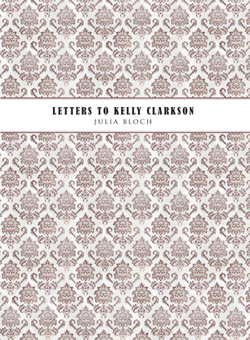
Reviewed December 21, 2012 by Chris McCreary.
“O fabulous starlet, O freight of sound,” Bloch enthuses of Kelly Clarkson, winner of American Idol during its first season and, in theory, the recipient of the unsigned, undated letters that make up this book. In the collection’s second letter, Bloch presents what could be her narrator’s statement of purpose: “I feel it’s time to wear more skirts, it’s time to change brains, it’s time to up my dose, it’s time for less empathy.” Whether crisscrossing the country or hunkering down in Philadelphia, she makes good on her sartorial promise and keeps Clarkson updated each high-heeled step of the way: “I’ve worn a pink skirt and tricked my hair in your honor,” she mentions early on, but most of her wardrobe is seemingly composed of blacks and reds, all colors that bear their own cultural freight.
As for her “less empathy” pledge, if it’s achieved, it’s through striving to maintain an intellectualized distance from the proceedings around her, even if such attempts tend to dissolve into the surrounding cult of pop-spectacle:
I try to dignify myself on the pale couch, writing these notes down, but inside I abandon myself to the next huge dream. In a moment you’ll know who your idol is. Girl you sure were swell up there, backlit and startling.
While Clarkson is an awe-inspiring figure in the book, she is also presented as part of something far more sinister: “it’s a system, and you are its fabulous, winged drone.” In the decade since she won Idol, Clarkson’s struggles to break free of the media machine that made her have been well documented, but we see in Letters how, by remaining in the public eye at all, she is subject to constant scrutiny: “If you look on IMDB you’ll see some people like your ass but not your face,” Bloch tells her at one point, and elsewhere she reports to the singer her seemingly mediocre ratings in categories ranging from “Sexiness” to “Personality & Talent” on AskMen.com.
Whether firing off questions about celebrity or sharing fragments of her own experiences with the singer, it’s clear that Bloch’s narrator expects no response from the larger-than-life Clarkson. A current, unnamed lover is a recurring figure, as is the somewhat mysterious figure from the past, K.. For the most part, these people flit around the edges of the letters, making the moments when their relationships are more foregrounded particularly impactful:
Dear Kelly,
K. came to my door in a pink skirt and a pink jacket, both the color of dust. She opened her mouth and some dust came out. I am not totally sure what happened between the foyer and the apartment door, I am stammering, I did the treadmill for 35 minutes. Her legs stuck out of her skirt and she murmured a lot, and almost cried, but did not cry one bit.
How long ago did this take place? Is it a dream? “Sometimes we cave into dream or fact, and sometimes we lack a theme song,” Bloch laments earlier in the collection, and passages such as this one suggest a very real pain half-hidden behind the narrator’s fantasies and digressions. This letter is not K.’s last appearance in the book, either: “Did I burn the letter, did I sleep with the T-shirt, did I wear the glass earring,” Bloch writes 10 pages later. “K. is gone, they moved to the suburbs and we were all here with the lights out.” Given the messiness that complicates such “real life” relationships, it is perhaps no surprise that so many of us, like Bloch’s narrator, escape into one-sided relationships with our celebrity idols.
Despite the lack of specific dates in these letters (“Relentless of time, blah blah blah”), there is a clear progression at work in the background: seasons pass as America votes for and inaugurates a new President and at least one more Idol. But, in this book, “the battle isn’t outside”; rather, it is about the internal lives of women — and one woman in particular — struggling with the confines of “femininity’s dystopic embrace.” While the narrator, Clarkson, and the book’s other women are constantly renegotiating their connections with (and disconnections from) one another and the world at large, their toughest struggles, Bloch implies, are within themselves.
“Listen,” Bloch states emphatically, “the face is all there is,” and in these letters the exterior is often presented as a barrier to emotional experience: “Sweater instead of fear. Eyeliner instead of reassurance.” In the end, the inner workings of Clarkson or the book’s other women might remain unknowable. Rather than treating these letters as the equivalent of a reality-show confessional booth, Bloch has wisely chosen a strategy in which what is not spoken — what is kept protected inside — becomes all the more powerful. These Letters work so well in part because the narrator’s thought processes, like the narrator herself, are often in transit, never holding still for very long. Therefore, the glimpses that we do get as Bloch’s narrator journeys across her own emotional landscape have a momentum that keeps the reader moving alongside her far beyond the collection’s last letter.